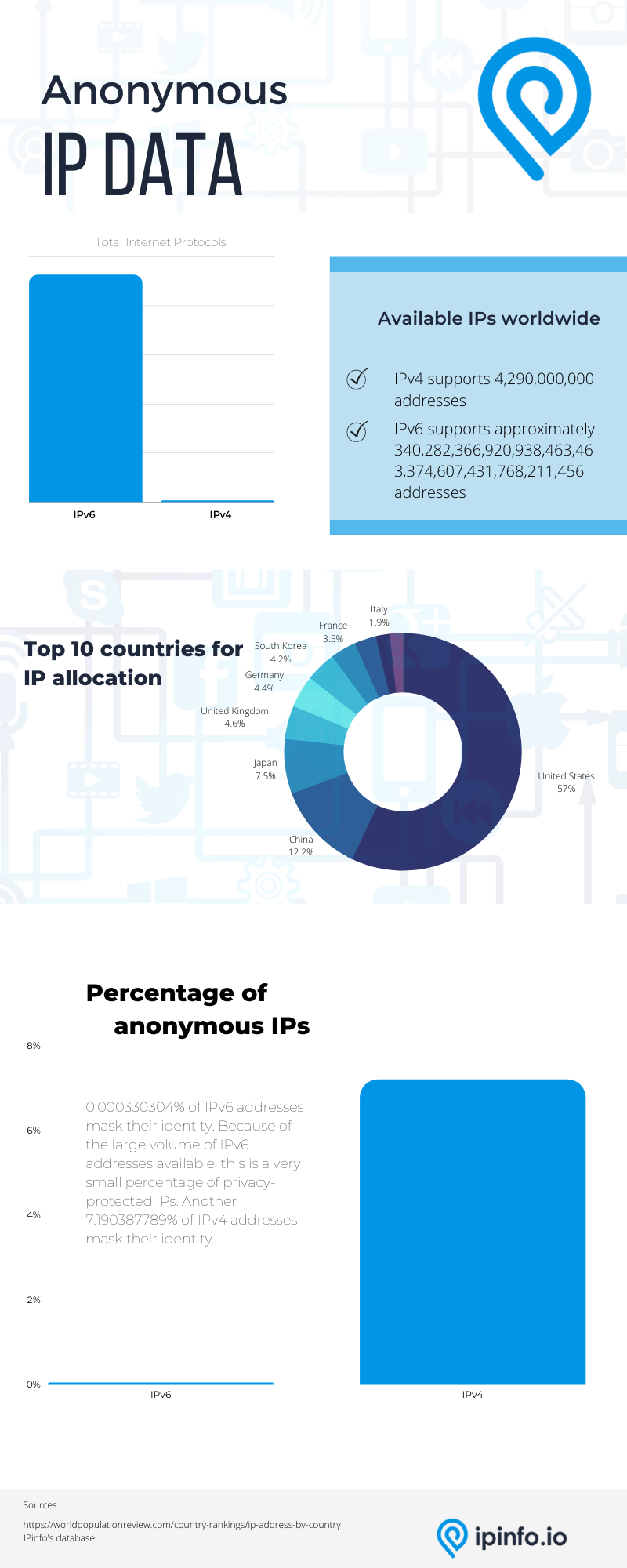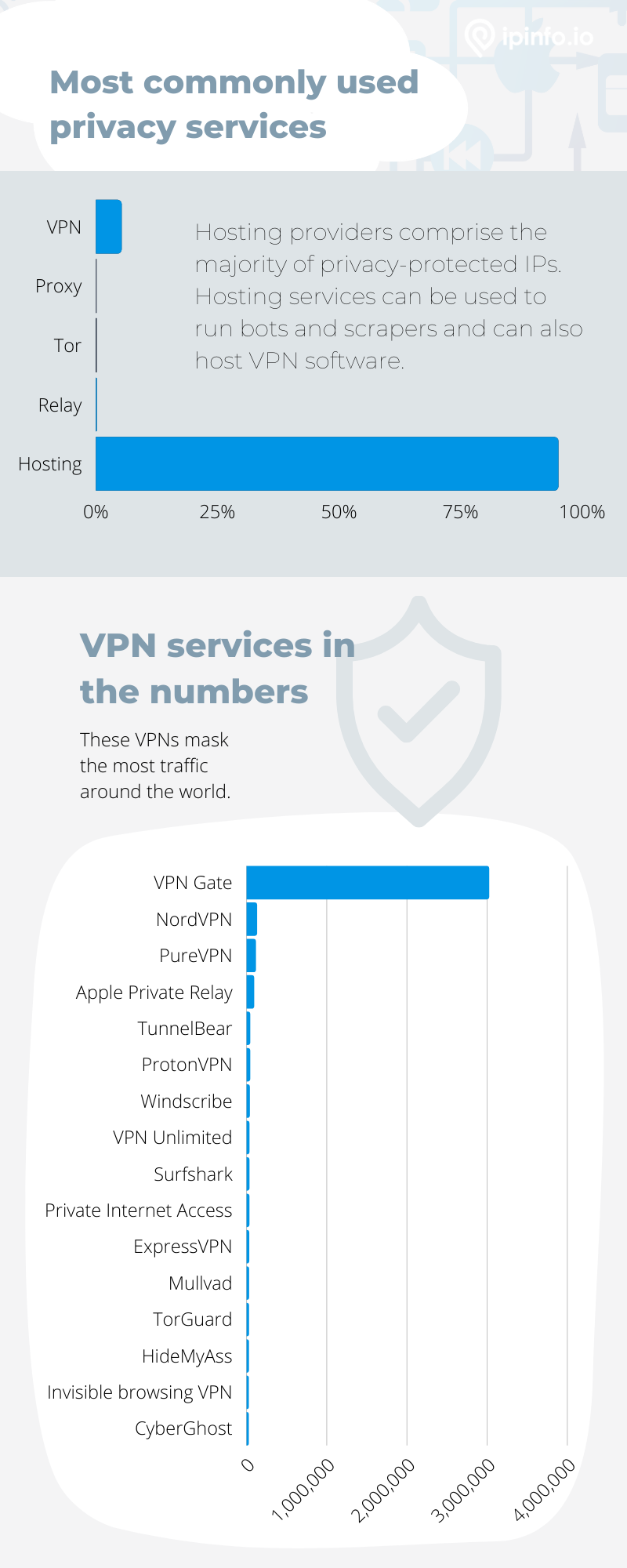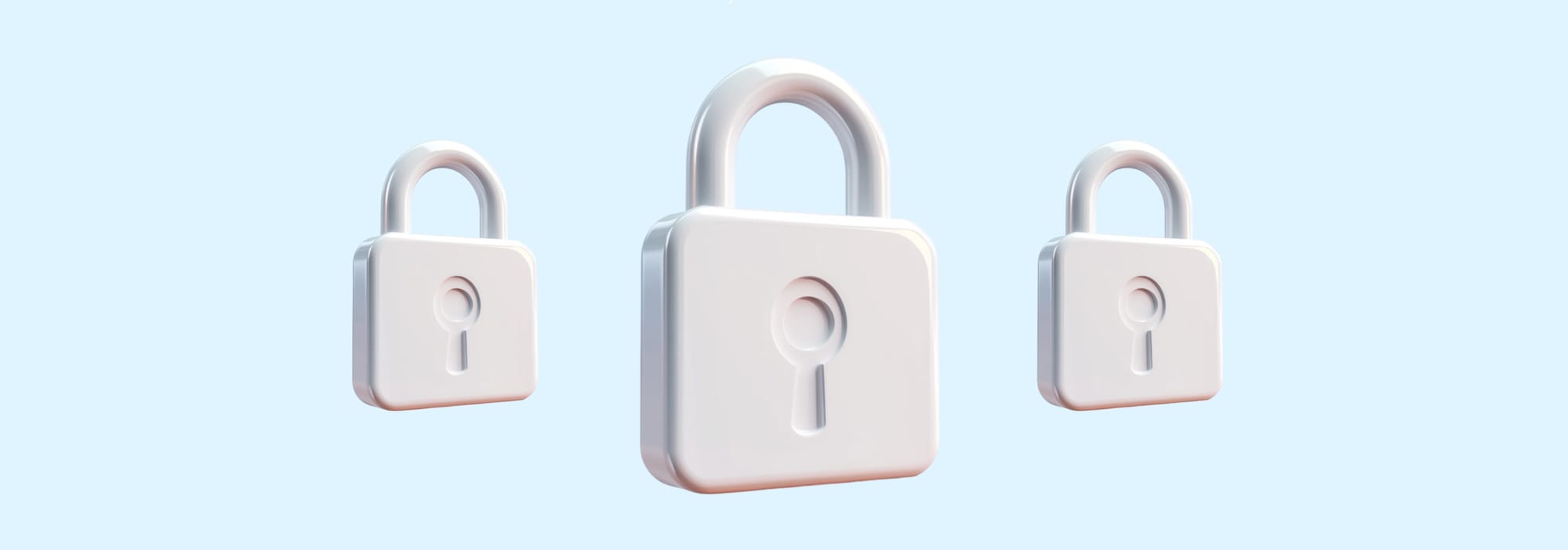 My IP ↗or
My IP ↗orIPinfo’s Privacy Detection API and Database Downloads offer insights about masked users, including what methods they use to hide their identity. From tor connections to hosting providers, proxies to Apple Private Relay, the Privacy Detection dataset helps enforce content restrictions, filter bots and spammers, fight fraud, and much more.
Within those parameters, however, many customers wonder about the most common methods that hide identities.
- How many masked identities are IPv4?
- How many hidden entities are IPv6?
- What’s more common? VPNs? Tor usage?
- What VPN services are the most widely used?
Our data team recently pulled some interesting metrics that answer all of these questions and more. Here’s what we found.
What percentage of IPv4 and IPv6 mask their identities?
Within our IPv4 and IPv6 databases, we noticed a few interesting trends. For starters, the total number of privacy-protected IPv4 addresses is around 308,824,000 that is 7,19% of the IPv4 database. In comparison, 0.00033% of IPv6 addresses mask their identity.
The discrepancy between IPv4 and IPv6 masked identities is due to the large pool of IPv6 addresses available to users. Additionally, IPv6 adoption is still growing as represented by the graph below.
The growth in IPv6 adoption may result in a change in the percentage of privacy-protected IPv6 addresses over time. But given how many IPv6 addresses are available, it’s not likely to increase percentage any time soon.
The percentage of all IPv6 addresses that use privacy protection services is 0.000330304%. Approximately 7.190387789% of all IPv4 addresses hide their identity.

Comparison of masked identities
Among privacy protection services, we also discovered some interesting statistics. Hosting services are used by most users who want to mask their identity. There are a variety of reasons for this, but here are a few explanations for this trend:
- Bots and spammers often use hosting providers to hide their identity
- VPNs can also be operated through hosting providers
Another interesting trend is that Apple Private Relay is outpacing tor and proxy users.
| VPN | Proxy | Tor | Relay | Hosting | |
|---|---|---|---|---|---|
| Total | 16193454 | 15102 | 1337 | 391394 | 293765713 |
| Percentage | 5.2435% | 0.0048% | 0.0004% | 0.1267% | 95,1237% |
This is notable since APR is geo-aware, meaning that IPinfo users can still use this data for geolocation targeting without gathering any personal identifiers.
Most common VPNs
Our data experts also pulled some metrics on the most common VPNs.
The most common, by far, is VPN Gate. Why might VPN Gate rank so high? While we can vouch for its popularity, we can’t say why most users opt for VPN Gate. However, it’s important to note that VPN Gate is free, open-source software, which may explain some of its popularity.
| Service | Number of IPs |
|---|---|
| VPN Gate | 3021604 |
| NordVPN | 127121 |
| PureVPN | 112520 |
| Apple Private Relay | 90839 |
| TunnelBear | 41612 |
| ProtonVPN | 41601 |
| Windscribe | 36733 |
| VPN Unlimited | 31967 |
| Surfshark | 31928 |
| Private Internet Acess | 31434 |
| ExpressVPN | 29263 |
| Mullvad | 27225 |
| TorGuard | 26296 |
| HideMyAss | 25382 |
Despite its popularity, it may not be as secure as other VPNs such as NordVPN, the second most popular VPN service. For instance, some research has shown that VPN Gate may be a higher risk for man-in-the-middle attacks due to server vulnerabilities.
Our metrics also showed that APR is in the top four privacy protection services. This is notable since APR has only been around for a short time. In fact, back in October, IPinfo's data experts began tracking a growing percentage of Apple Private Relay users.
As was already mentioned, iCloud Private Relay is geoaware, allowing geolocation targeting. That's why, in response to the growing number of APR users, IPinfo now offers an enhancement feature to our Privacy Detection data for users with paid plans, such as the Business Plan.
Beyond tracking APR usage, though, we’ve also compiled a visual comparison of the most commonly used privacy services and the top sixteen VPNs.

Implications
Masked identities pose security threats for a variety of industries. The Privacy Detection database tracks many forms of hidden IP traffic.
Digital rights management
To protect copyrighted content, organizations use a variety of tools to monitor access. Monitoring users’ geolocation is one way to limit access to streaming services, digital publishing, sensitive government documents, attack surface, and more.
Beyond IP geolocation, however, these organizations can also detect and prevent masked IPs from accessing content. For instance, Hulu and Netflix limit hidden users from viewing shows or movies to protect their content from copyright infringement. Here are just a few industries that use IPinfo’s Privacy Detection data for digital rights management:
- Gambling and gaming
- Governments and institutions
- Digital media and entertainment
- Cybersecurity
- Ecommerce
These industries also benefit from geo-aware privacy detection. By separating masked identities from other geo-aware privacy services, APR users can access copyrighted content. At the same time, these organizations can restrict content for higher-risk entities, such as VPN users.
Digital infrastructure security
For industries with high stakes - such as Fintech, Cybersecurity, Healthcare, and others - security issues from VPNs can introduce additional vulnerabilities. Additionally, as governments and other organizations monitor employee access, hidden IPs can threaten the security of sensitive files, servers, and data.
Reducing attack surfaces means detecting these IPs before they gain access to servers. That’s where IPinfo’s Privacy Detection data can help.
Discover what anonymous IPs are accessing your sites. Sign up for a free weeklong trial that includes our Privacy Detection datasets!
About the author

Internet Data Expert
